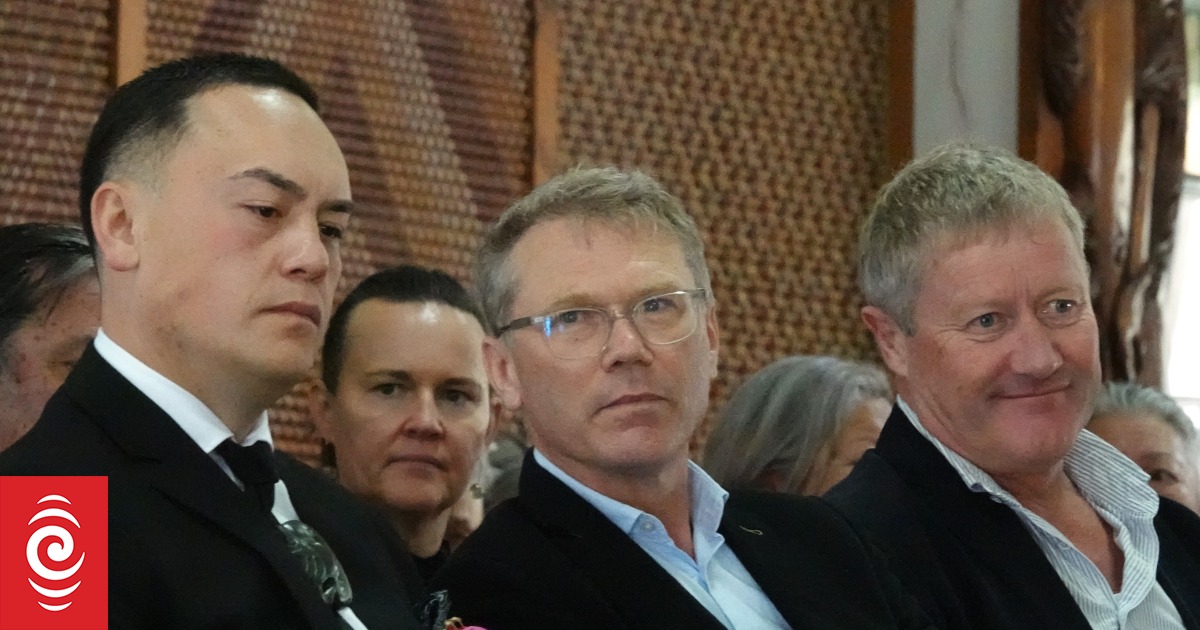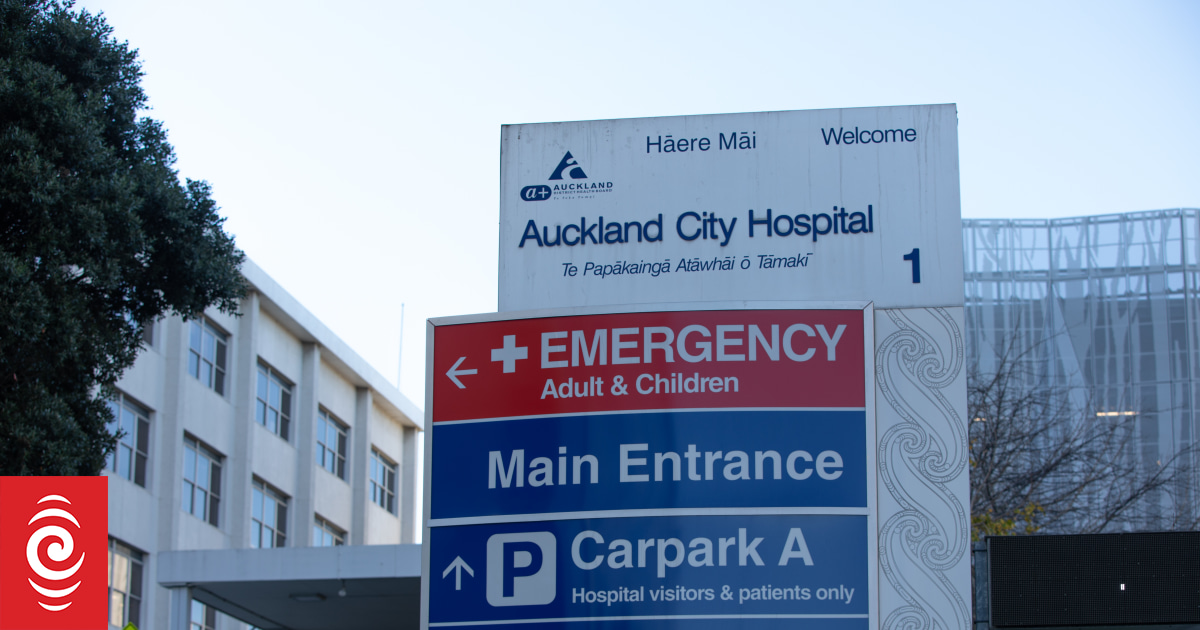
From left, kaikōrero Isaiah Apiata, Treaty Negotiations Minister Paul Goldsmith and Northland MP Grant McCallum listen to the speeches of welcome
Photo: RNZ / Peter de Graaf
Treaty Negotiations Minister Paul Goldsmith hopes to be the minister that finally gets a long-awaited settlement with Ngāpuhi across the line – but how that happens will up to the hapū.
Goldsmith travelled to the Bay of Islands on Wednesday where – for the first time since he became minister – he met the hapū of Ngāpuhi to hear their Treaty settlement aspirations.
His visit came against a backdrop of many failed attempts to settle the Treaty claims of New Zealand’s largest iwi, including a divisive, ten-year-long effort to set up a mandated authority to negotiate on Ngāpuhi’s behalf that was finally abandoned in 2018.
Goldsmith insisted he would not make the same mistake.
“I’m not one of these ministers who’s going to turn up and say, this is how we’re going to do it,” he told hapū representatives at Whitiora Marae in Te Tii.
“Clearly that does not work, it has never worked, and it’s not my approach. I’m here to listen, to get a sense of how you want to move forward because as a government we would love to be able to settle with Ngāpuhi.”

Treaty Negotiations Minister Paul Goldsmith addresses the hapū of Ngāpuhi at Whitiora Marae.
Photo: RNZ / Peter de Graaf
Goldsmith said the government’s preference was for a single, large commercial redress to cover all of Ngāpuhi, possibly with a number of separate cultural settlements negotiated with various hapu groupings.
“But ultimately it’s for you to decide who you want to talk to us and how that process will work,” he said.
Goldsmith said he had been reminded frequently that much discussion and many ministers had come before him, without achieving a settlement.
However, he was hopeful of being the minister that finally made progress.
He said there were two things the government could do that would make a big difference to Northland – “build a decent road and conclude a settlement with Ngāpuhi”.
“There’s a reason this hasn’t happened before. There are many challenges, a variety of views, high expectations. So we’re going to work at it with our very best efforts, and we’ll see how we go. I can sense there is a willingness and enthusiasm, amongst some, to make it happen this time. I’m not going to force it, I can’t force it, it’s a matter of working together.”
Goldsmith had been invited to the two-monthly hui of Te Kotahitanga o Ngā Hapū Ngāpuhi, the group set up in 2009 to oppose the mandated iwi authority Tuhoronuku.

Isaiah Apiata (left) leads Treaty Negotiations Minister Paul Goldsmith and his delegation onto Whitiora Marae.
Photo: RNZ / Peter de Graaf
One of the key speakers, Ngāti Hine leader Waihoroi Shortland, told the minister he wanted one thing above all else from Wednesday’s hui.
“I want clarity, because we have waited a long time to meet someone who at least is willing to begin where our ancestors left off. We are still standing in the place where they made their promises 184 years ago.”
Shortland lamented the fact hapū had to start again with a new minister every time the government changed.
“You are now sitting in a chair in which we have invested a fair amount of time, for the last decade or so, trying to educate each of your iterations as Minister of Treaty Settlements. And they’ve come and they’ve gone, and now you are here. We hope your learning will be far quicker,” he said.

Ngapuhi rangatira Hone Sadler addresses the Minister at Whitiora Marae.
Photo: RNZ / Peter de Graaf
Hinerangi Himiona, who spoke on behalf of Te Waimate-Taiamai, had a different kind of message for the minister.
“The government’s been hugely attacking on te ao Māori, reo Māori, tikanga, education, mokopuna in state care … we’re walking into all these attacks,” she said.
“Those of us who have the capability to keep our people together and keep working towards what settlement might look like, we’re having to spread ourselves really thin. We’re really exhausted. I guess what I’m asking is, ‘C’mon mate, give us a break’.”
Others spoke of their frustration at the government’s rejection of the Waitangi Tribunal report that found Ngāpuhi chiefs did not cede sovereignty when they signed Te Tiriti.
Te Kotahitanga o Ngā Hapū Ngāpuhi chairman Pita Tipene welcomed the minister’s clear rejection of frameworks the government had tried to impose upon hapū in the past – even if the government’s preference was still for a single settlement.
“But really it’s up to the hapū and how we want to configure ourselves. So we’ve got a lot of work to do.”

Kaikaranga welcome Treaty Negotiations Minister Paul Goldsmith into the whare.
Photo: RNZ / Peter de Graaf
Despite divisions among Ngāpuhi, illustrated during the hui by disruptions from speakers not on the speaking list, Tipene was confident hapū could work together to reach a settlement.
“I think the divisions were caused by government interference. When Ngāpuhi get together, we can do things together, as we showed at the hui. We came together, we spoke, we listened. There were a few ructions, but we smoothed them out in a hurry too.”
Before the hui Goldsmith visited Pākinga Pā near Kaikohe, a hugely significant pa site returned to iwi by private landowners, and Lake Ōmāpere, the former “food basket of Ngāpuhi” which is now severely polluted.
Afterwards he visited Kororipo Pā at Kerikeri Basin, once the base of chief Hongi Hika.
Goldsmith also revealed a Northland connection – Ratcliffe Bay, in Whangaroa Harbour, is named after his great-great grandfather.
Wednesday’s hui was hosted by Ngāti Rēhia hapū.




